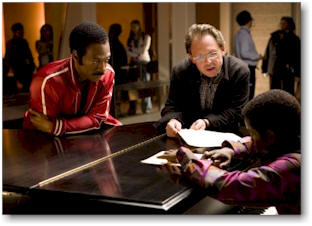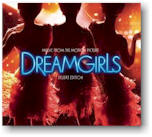Dreamgirls (2006)
Film Reviewed by Michael Dequina
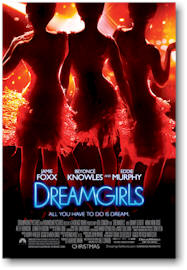 Dreamgirls (2006)
Dreamgirls (2006)
Rated PG-13 for sex, expletives, and drug use.
Running time: 125 minutes
Studio: Dreamworks Pictures
Reviewed by Michael Dequina
Films that see release at this time of year usually fall into one of two categories: (1) pretentious awards bait or (2) pure entertainers. Hardly usual is the case where something comes along that fulfills one’s desire for a rousing, exhilarating spectacle while at the same time having solid dramatic substance and lasting resonance. With his screen adaptation of Henry Krieger and Tom Eyen’s celebrated stage musical Dreamgirls, writer-director Bill Condon has achieved that rare, delicate balance, in so doing crafting a film that is sure to have as enduring a legacy as its source material.
|
|
In the film’s opening moments, though, Condon seems intent on simply overwhelming the viewer with sheer sensory assault. Without so much as even a title card, he immerses—or, rather, submerges—the audience into the world of ’60s Detroit and the lives of a trio of young, ambitious female friends and singers calling themselves the Dreamettes. They are barely introduced by name—Deena Jones (Beyonc’ Knowles), Lorrell Robinson (Anika Noni Rose), and lead singer Effie White (Jennifer Hudson)—before ambitious car saleman-cum-talent manager Curtis Taylor Jr. (Jamie Foxx) plucks them from being talent contest also-rans to new backing act to flamboyant R&B star James "Thunder" Early (Eddie Murphy).
After hitting the ground not only running but downright sprinting, Condon, aided by the electrifying work of editor Virginia Katz, never lets up, and the film’s slightly two-hour-plus run time—covering roughly a decade of movie world time—really flies by. Such a fast pace does somewhat keep the characters at an arm’s length, but only in the initial stages; that the viewer is so instantly immersed in the film’s milieu actually makes one almost vicariously experience the Dreamettes’ meteoric rise right along with them—and their behavior when being thrust in such a whirlwind situation is a more efficient and effective way of illuminating character. Despite her initial hesitation and better judgment, Lorrell falls into a hopeless affair with the very married Jimmy; the insecurities behind Effie’s big-voiced bravado manifest themselves in both self- and outwardly destructive ways when Curtis, who has become Effie’s lover, rechristens the trio as a separate act under the streamlined moniker The Dreams—with the more mainstream-palatable, if less vocally gifted, fashion plate Deena in the lead spotlight.
Whatever blanks remain in the characterizations are shaded in by the solid cast, which Condon has smartly, cleverly assembled with not only actors who are ideal for the roles but on whose off-screen personae the roles make a sly meta comment. Having Knowles in place as the focal, breakaway star of a successful girl group plagued with personnel shifts is loaded enough, but Condon also uses common criticisms of her previous film work to the film’s advantage. Often knocked as registering as somewhat of a blank on the big screen, Knowles on paper seems all too perfect as the meek, malleable, tabula rasa that is Deena, and indeed she nails that aspect of the part down; the childlike, walk-on-eggshells fear that she lends Deena in a dinner scene with Curtis is one of her finer screen moments. But then she and Condon have the last laugh, subverting all anyone has seen of her in this film and before with a startling climactic musical number, the original tune "Listen" (a shoo-in for a Best Original Song Oscar nod, if not the statuette itself), during which not only Deena vividly, convincingly becomes a fully-realized person, but Knowles for the first time becomes a truly dimensional actress. After being straitjacketed in too many phone-it-in formula family films in recent years, it’s almost easy to forget how dimensional an actor and downright electrifying a performer Murphy can be, as he is here as Jimmy. Playing the all-too-familiar role of a raucous, raunchy star struggling to conform to a safer image to stay popularly relevant, Murphy is liberated in every sense—not only in Jimmy’s cut-loose stage performances but also in exploring the darker edges of the character and storyline. Of the three above-the-line stars, Foxx’s villainous turn may seem too subdued and, to some observers, rather one-note, and, granted, his work here is missing a certain sense of revelation that come with his co-stars’ performances. That said, Foxx’s cocky, confident public image well informs Curtis’s snake-like personality, and he brings the necessary nuances that elevate the character beyond stock in the later stages; as the svengali finds his vise-like sense of control gradually slipping, what goes on in his eyes speaks more eloquently than mere words.
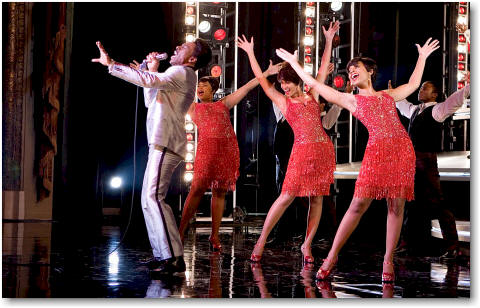
Eloquence can escape the most glib commentator when it comes to Hudson’s acting debut, and with good reason. There’s really not much that can be added to what has been said and what will be said about how she nails her character’s—and the entire film’s—emotional and dramatic linchpin, the legendary "And I Am Telling You I’m Not Going" declaration to Curtis, in which Hudson pays tribute to Broadway originator Jennifer Holliday’s wrenching, Tony-anointed interpretation while creating her own distinctly agonizing spin. The key to the song is basically to undergo the five stages of death in five minutes, and Hudson, as her wounded plea crescendoes into a lacerating wail, restores the hemorrhaging heart and searing soul to what has become an oft-performed It’s Showtime at the Apollo /American Idol staple, now freshly devastating as if hearing it for the first time. Doing The Song proper justice would probably be enough for most audiences, but Hudson proves to be an all-around natural, delivering a surprisingly full-bodied performance: from the song performance numbers to the straight dialogue sequences, she is Effie through and through—sassy, funny, sexy, and heartbreaking even when not uttering a sound, as she commands the camera with her vividly expressive face through every beat of her tumultuous roller coaster journey.
The more secondary roles are also cast and played with care. Rose has her memorable moments of comic relief (particularly in the early-going), but she also gives Lorrell a very involving girl-to-woman arc analogous to Effie and Deena’s with her frustration and conflicted love for Jimmy. Keith Robinson makes the good intentions and core heart of C.C. White, Effie’s brother and the Dreams’ songwriter/choreographer, palpable even when he eventually has to turn against his sister; never once does he seem self-serving but simply more interested in a more beneficial direction for the most people. The character of Michelle Morris, Rainbow Records secretary-turned-Effie’s replacement, has a minimum of screen time, but in those moments we do see how an idealistic newcomer to the business can instantly have such illusions brought to earth, and Sharon Leal’s turn, due to the limited screen time, is likely to not get the full due for being the effective team player effort that it is—not just as part of the ensemble but also in reinforcing the themes of the price of fame and success. Danny Glover, playing Jimmy’s veteran manager Marty Madison, will probably be the most underrated given his is a songless part, but put someone else in there as Marty—or anyone else in these supporting roles—and the mix would have been upset a bit.
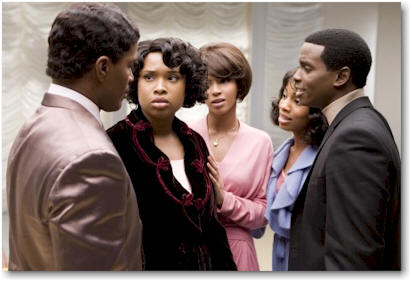
Jamie Foxx, Jennifer Hudson, Beyonc’ Knowles, Anika Noni Rose, Keith Robinson
The spot-on casting the accordingly strong performances are just a small portion of the truly virtuoso job Condon has done here as director and screenwriter, adapting the original stage book by Eyen. Beyond the obvious razzle-dazzle spectacle and the finesse with the musical numbers is the attention to detail. He inserts welcome signposts that place the action in its proper historical and sociological context, but even nicer are the more subtle grace notes here and there—from Curtis’s halting expression in his first encounter with Deena, giving his second act ode to her, "When I First Saw You," all the more resonance; to having one of Effie’s finger points during one of the last "You’re gonna love me!" cries be in the direction of a mirror reflecting back at herself—that show a clear top-to-bottom understanding of his material. The first moment the film transitions from stage performance numbers to book/dialogue songs with "Family" (a couple of Curtis’s lines in "Steppin’ to the Bad Side" notwithstanding) may seem a bit jarring considering it occurs about 45 minutes in, but it is the first true instance where the emotion cannot be contained by spoken dialogue, not to mention after Effie’s declaration that she has "the voice," it makes character sense that she would resort to singing in her defense. Condon continually finds fresh angles such as that in Krieger and Eyen’s songs, often using them as score to comment on the screen action: in "When I First Saw You," Curtis sings of his dream—which isn’t truly a life with Deena than creating the perfect commercial commodity with her—as she is photographed as not so much a person than a variety of increasingly glammed-up and rather inhuman products; Effie’s somber take on "One Night Only" is given a juxtaposition that lends the song a deeper resonance as a comment on one character’s life and the transient nature of fame itself. Such heavier elements give Dreamgirls some necessary dramatic gravitas, but they don’t weigh down the film from being, for all intents and purposes, a superlative, spectacular entertainment. That the story is so familiar a rise-and-fall showbiz story actually lends Condon free rein to let his imagination and creativity run free in putting on a grand show. While he makes some terrific nods toward Michael Bennett’s celebrated original Broadway staging (the light towers and scaffolds during "Steppin’ to the Bad Side"; the wall of lights that serve as backdrop to Deena and the Dreams’ discofied "One Night Only"), he has also done what some directors of recent musical adaptations failed to do: reimagine the material as cinema. From the elaborate, period-perfect costuming and production design to sumptuous colors captured by Tobias Schliessler’s camera as it gracefully navigates the expanded cinematic space, Condon creates an enticing, exciting world.
| |
There has been much speculation as to if Dreamgirls will mean a new life for the Hollywood movie musical, which since its grand rebirth with 2001’s Moulin Rouge! and 2002’s Chicago has hit some commercial and critical turbulence. That’s a bit too weighty a responsibility to foist onto what is, above all else, a great time at the movies, and it should ultimately be enjoyed and savored as such—the terrifically entertaining, ovation-worthy spectacle that results from the assembled efforts of a gifted, impassioned, invigorated creative crew.
Related Links
Dreamgirls (2006)- Reviewed by Kam Williams
http://aalbc.com/reviews/dreamgirls.htm
Jennifer Hudson Interview on AALBC.com
http://aalbc.com/reviews/jennifer_hudson.htm
Eddie Murphy Interview on AALBC.com
http://aalbc.com/reviews/eddie_murphy.htm
Movie Website
http://www.dreamgirlsmovie.com/
NYFCO Movie Awards - Jennifer Hudson Award Winner
http://aalbc.com/reviews/2006_nyfco_movie_awards.htm
Dreamgirls Lands Most Nominations But Snubbed for Best Picture
http://aalbc.com/reviews/dreamgirls_snubbed_for_best_picture.htm

Read More AALBC.com Film Reviews

